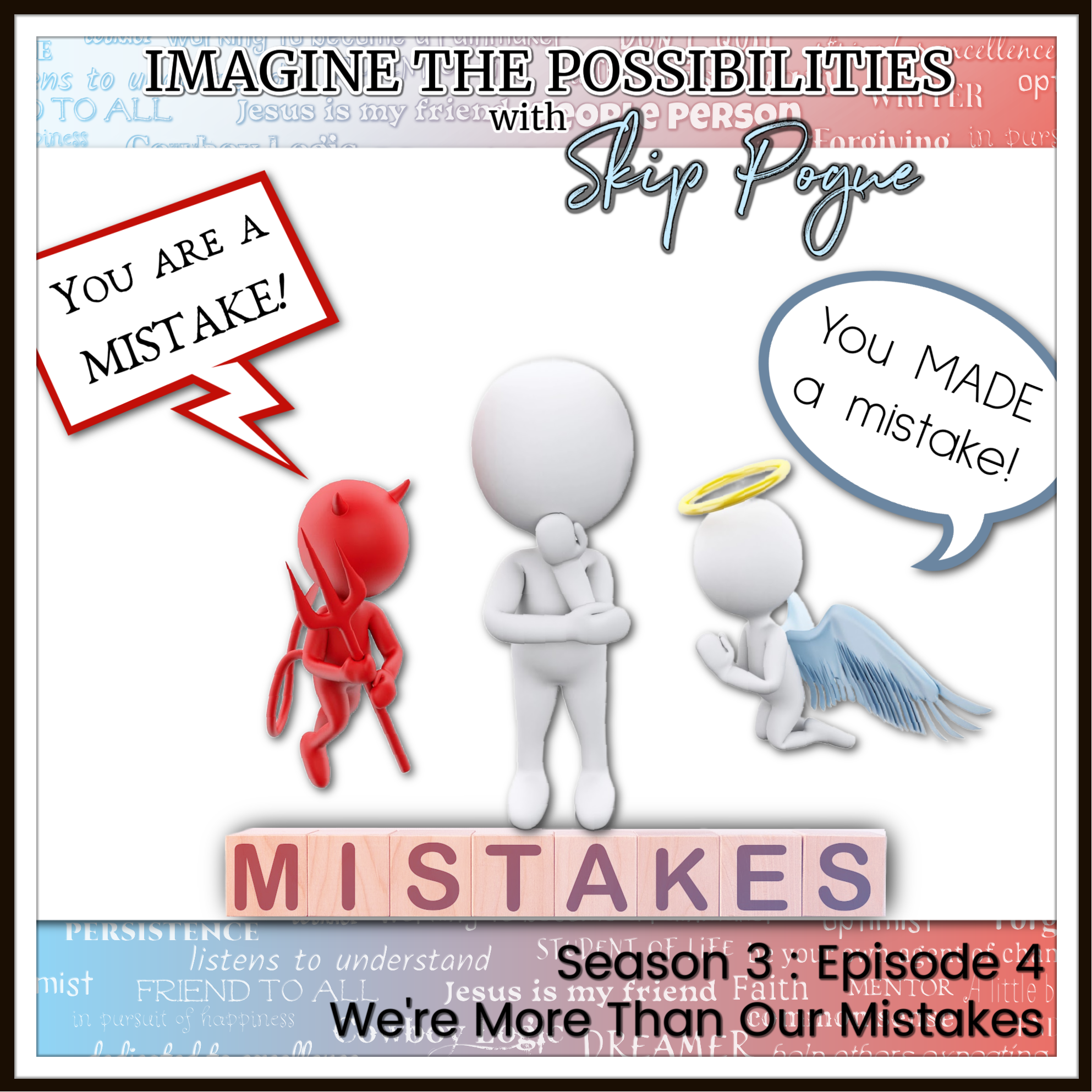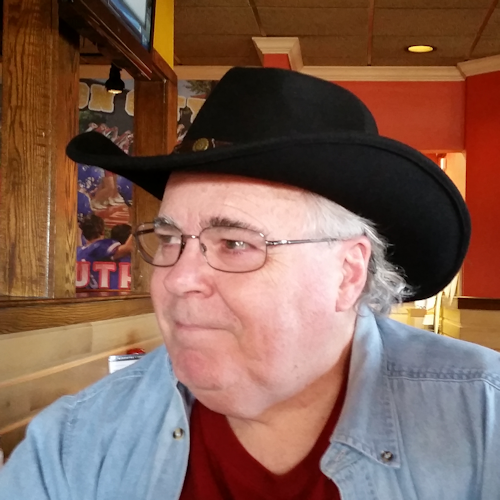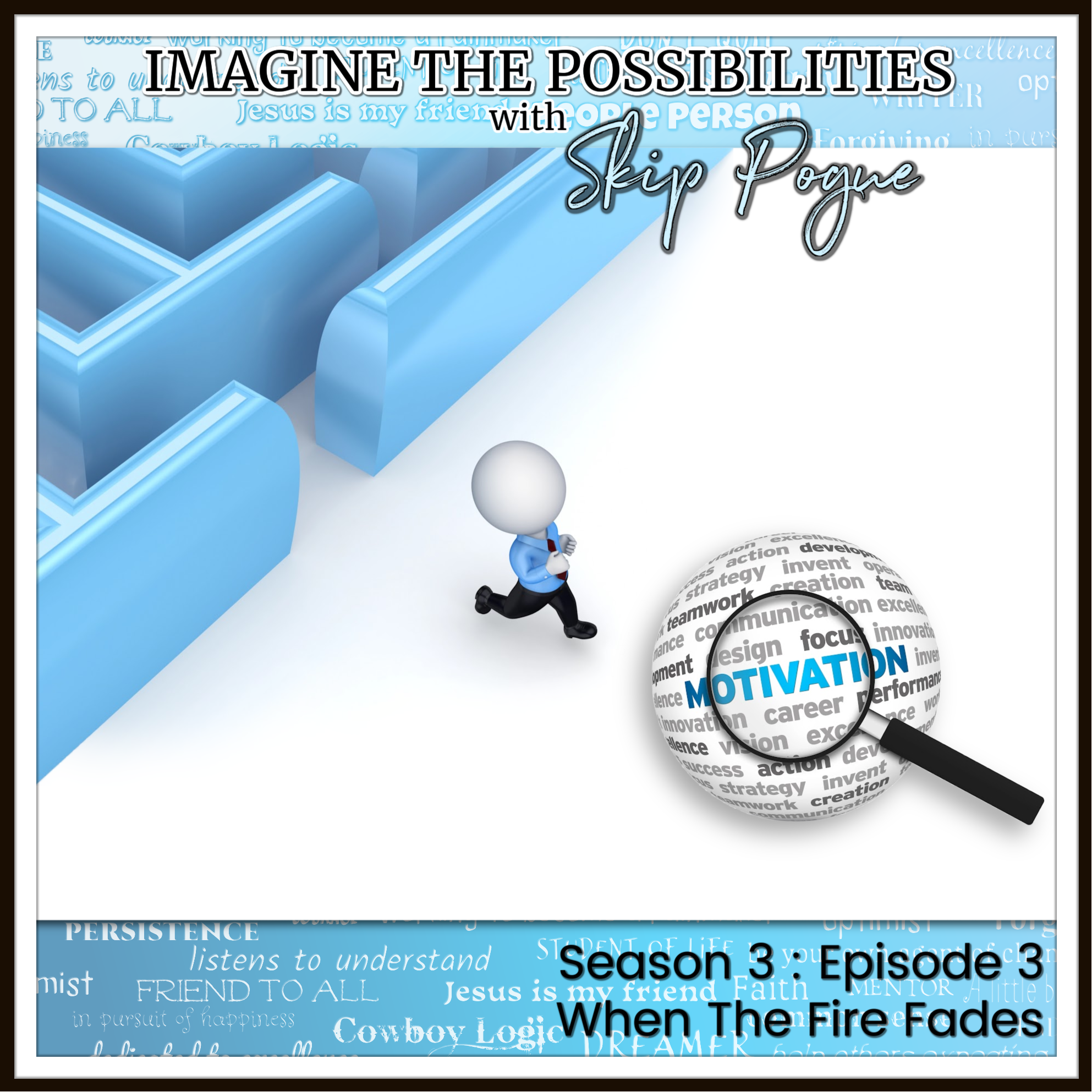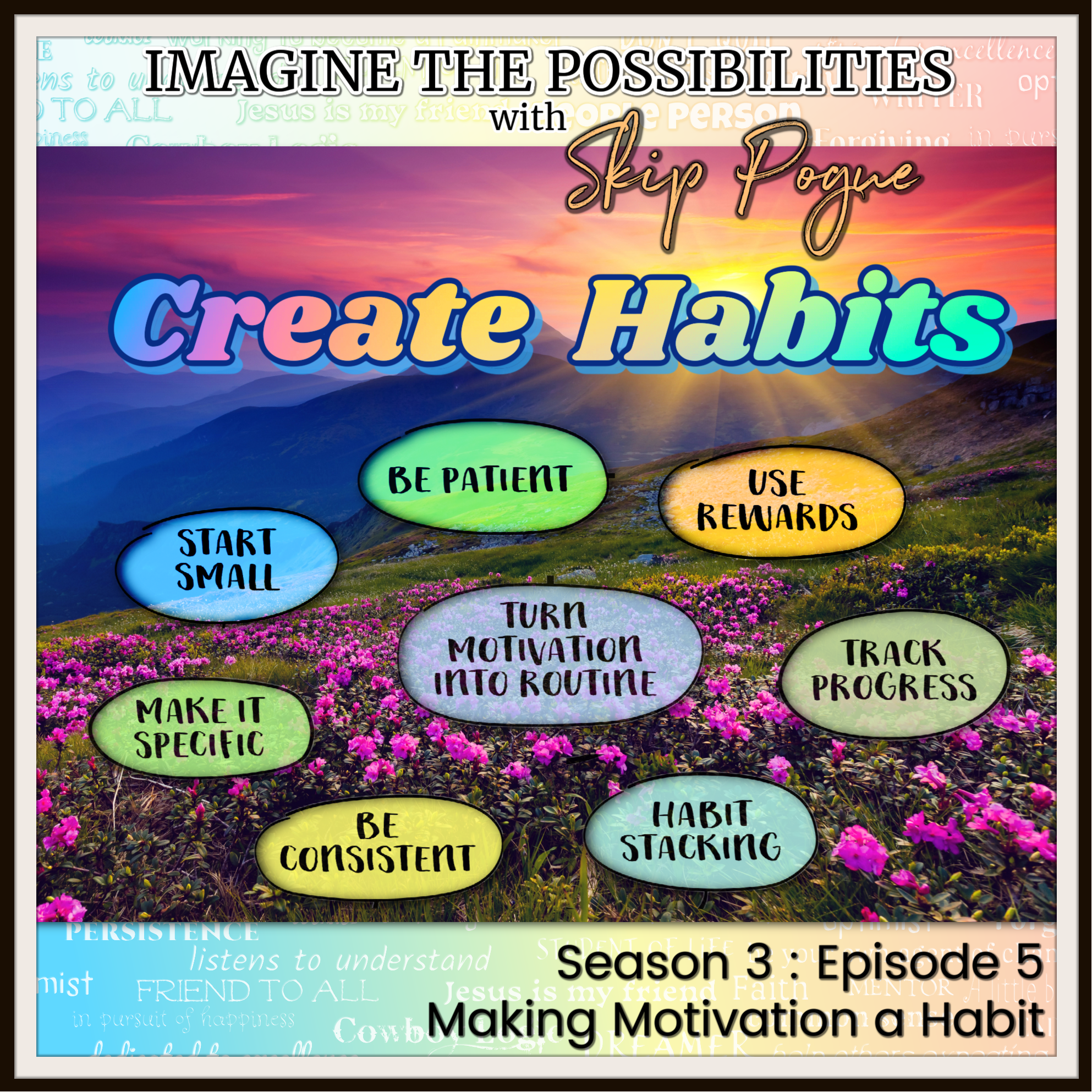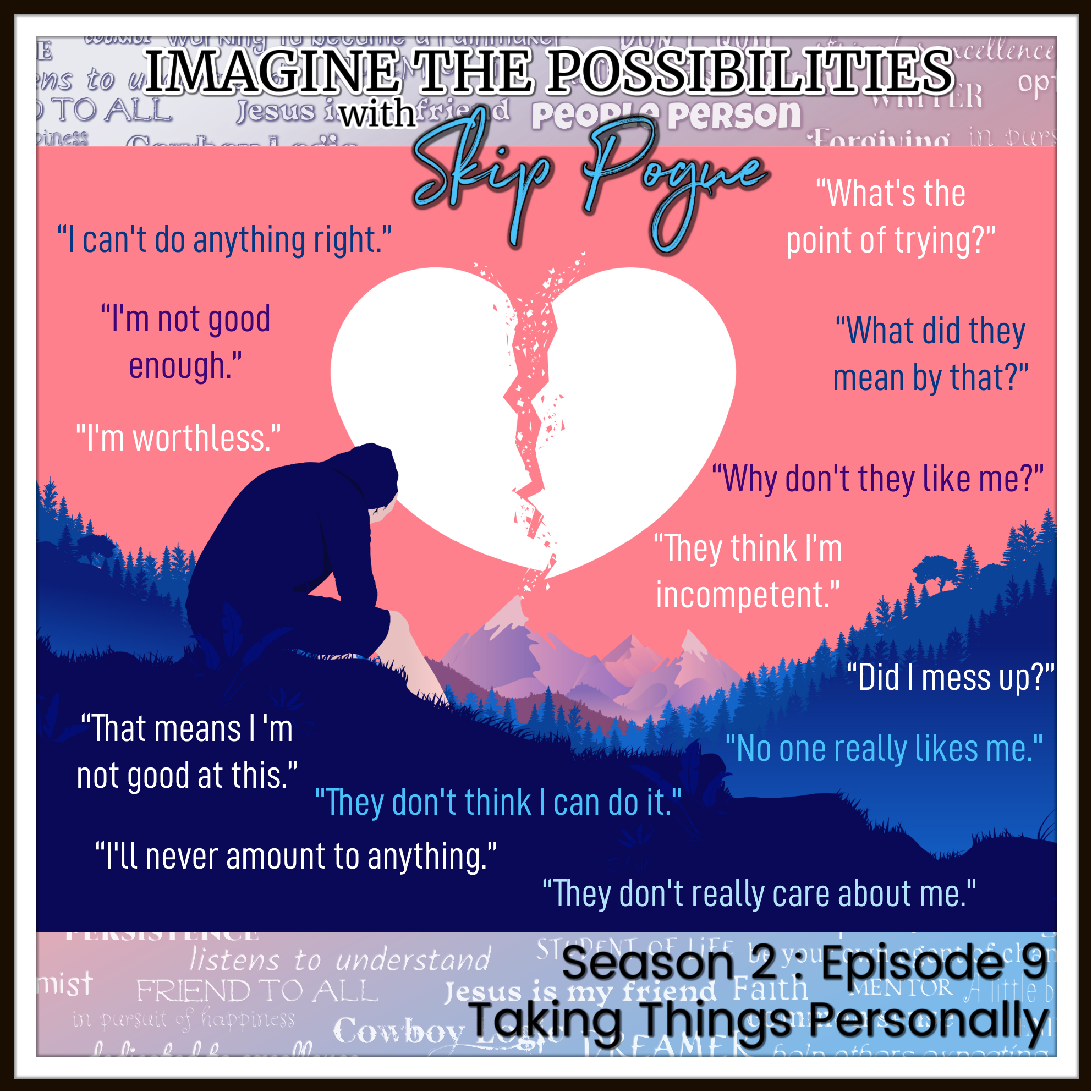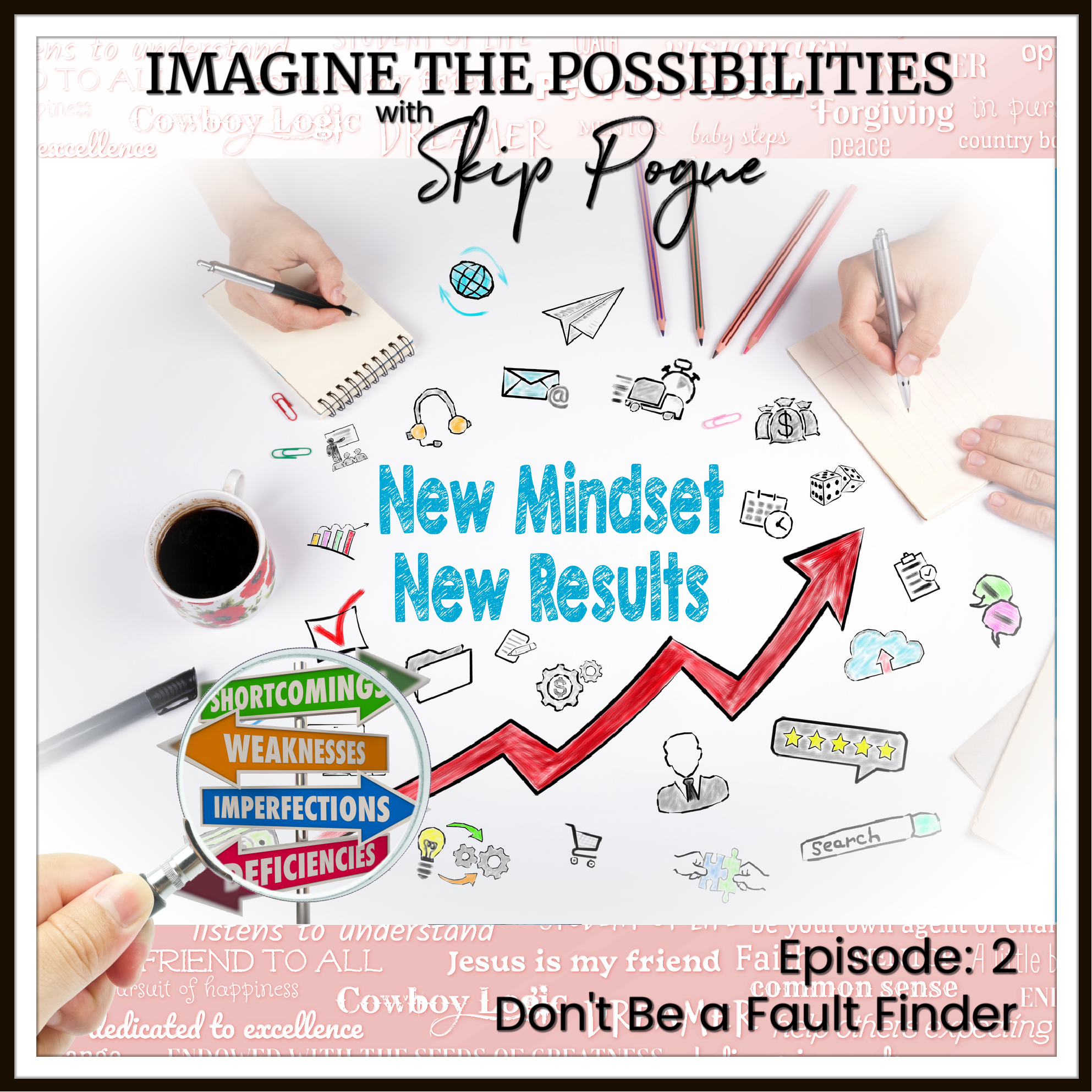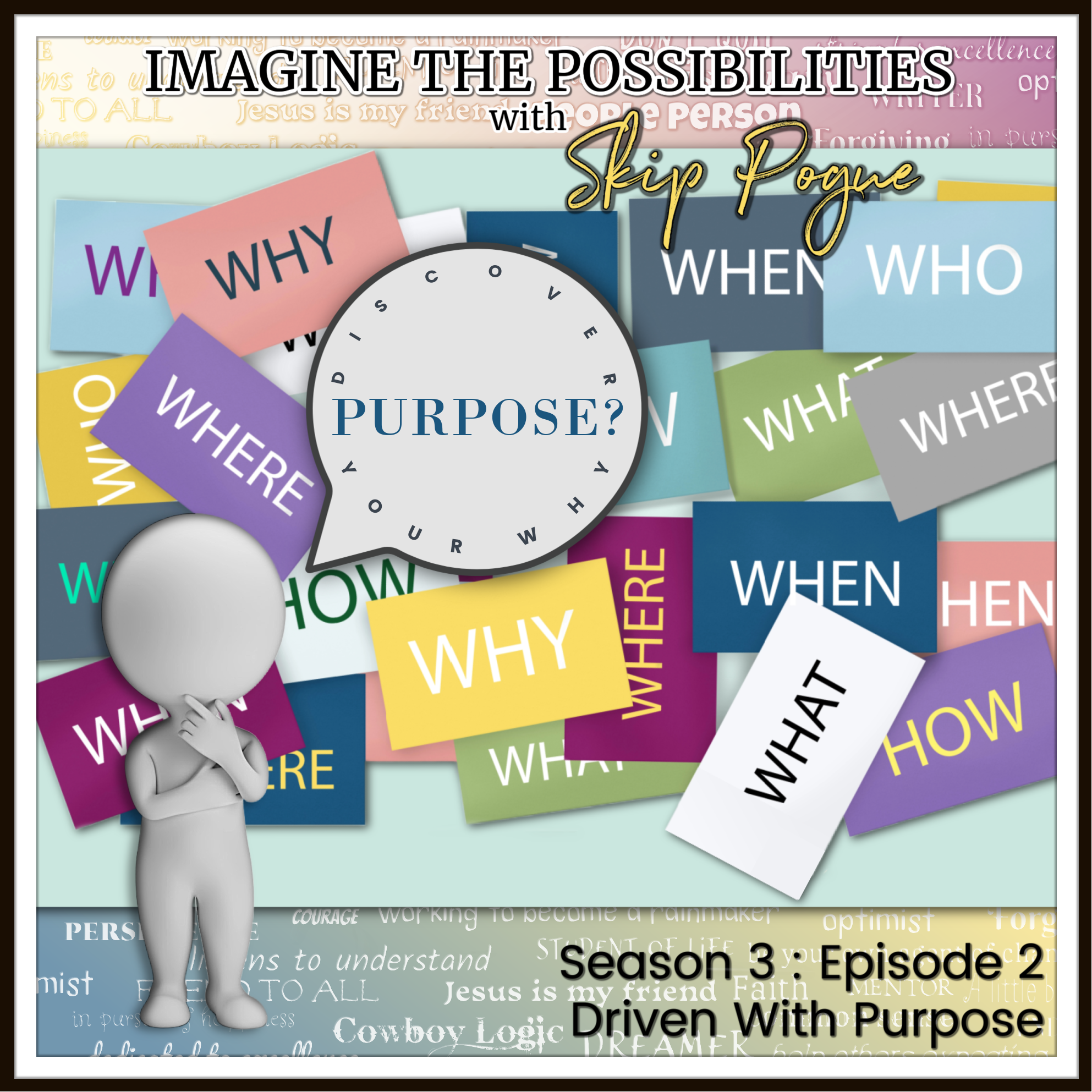In today's episode we’re talking about something deeply personal: knowing we’re more than our mistakes. We’ve all had moments we wish we could take back, but those mistakes don’t define us. I’ll share why we make them, how to move forward, and five practical steps that can help you reclaim your worth and write a better next chapter. I’m so glad you’re here with me today. Whether you’re enjoying a cup of coffee, out for a walk, or just taking a moment for yourself, thank you for sharing this time with me!
View Full Transcript
Episode Transcript
[00:00:12] Hello, friend, and welcome back to Imagine the Possibilities. I'm Skip Pogue, and I just want to thank you for spending some time with me today. Whether you're sipping your coffee, which is what I'm doing, out for a walk, or maybe just trying to get some me time in your day, I'm truly grateful that you're here.
[00:00:32] Today's episode is called We're More Than Our Mistakes.
[00:00:37] And I don't just want to talk about that. I want us to believe it. I want us to understand it. I want to help you, and I understand what it is.
[00:00:49] Here's the thing, and I really have to admit, this all applies to me.
[00:00:55] We've all had moments in our lives we wish we could simply hit the rewind button and start over.
[00:01:02] Words we've spoken, chances we didn't take, opportunities we missed.
[00:01:09] People we've hurt even when we didn't mean to.
[00:01:12] But it's all part of being human.
[00:01:16] But what do we do?
[00:01:18] What happens next after the mistake that can shape how we see ourselves for years to come?
[00:01:27] So let's talk about that.
[00:01:29] Why do we make mistakes?
[00:01:32] I think the first part of it, we have to understand that mistakes are inevitable.
[00:01:38] Nobody goes through this life without making mistakes. Nobody goes through this like spotless.
[00:01:46] No matter how polished someone's life may look from the outside, we all carry stories that we'd rather forget.
[00:01:55] We often repeat mistakes due to a combination of habits, biases, and emotional factors.
[00:02:05] These things can include a tendency to rely on familiar patterns on or a lack of awareness about the root cause of an issue or a fear of change.
[00:02:19] I've always liked this quote.
[00:02:22] Insanity is doing the same thing over and over again, expecting different results.
[00:02:29] Now, obviously that's not the definition of insanity.
[00:02:34] I do think that it pretty much hits the nail on the head when we're talking about repeated mistakes.
[00:02:41] I want to take a little bit of time and look at some of the reasons that we make mistakes or repeat the same mistake.
[00:02:50] Sometimes they're simply out of habit or familiarity.
[00:02:54] We take shortcuts. Our mind often takes mental shortcuts, relying on past experiences and established patterns even if those patterns are lead to errors. Do we all do that sometimes we're so used to doing something a certain way, we just continue down that road.
[00:03:14] And even or when we get to the end of that, we find that what we've done is a mistake, we've made a mistake, or it's an error however you want to look at it.
[00:03:27] Familiarity.
[00:03:28] When we talk about something being familiar, it can be Something that is not successful, it's a mistake.
[00:03:38] The outcome is not optimal.
[00:03:41] And the issue is doing that, making it hard to break free of repeating the same thing over and over again, the same mistake.
[00:03:52] Habitual behavior habits, if you will. The thing is that repeated actions, even if they're wrong or flawed, can become so ingrained as a habit that it's difficult for us to change.
[00:04:08] I did a podcast on confirmation bias.
[00:04:11] What that is is a lot of times we have something we want to think about, talk about, read about, whatever, and we want to do the research in such a way.
[00:04:25] Now Google is a friend of ours, right? But we want to do the research in such a way that it confirms what we believe, even if our beliefs are flawed.
[00:04:37] Other times our mistake can be caused by a bias we have.
[00:04:43] Those biases are errors in our thinking, how we think about what we're doing and in our decision making process.
[00:04:52] These type of mistakes occur because of our reliance on simplified mental shortcuts or having flawed reasoning, not thinking through things. Well, sometimes another one is target fixation. That's when we become so focused on a specific outcome that we fail to see other potential problems or solution. And that oftentimes leads us repeated errors.
[00:05:22] When we talk about this, we've also got to think about some emotional factors that come into play. A big one. Fear of change. We have a comfort zone. We're comfortable with familiar things. The problem is sometimes we let that familiarity outweigh our fear of the unknown. Even if what we believe we know is detrimental to what we're doing.
[00:05:47] Think about that. Our comfort zone plays into that. Even if we know what we're about to do is wrong because it's familiar with us or to us. Outweighs everything.
[00:06:00] Got to make that better.
[00:06:01] Have to not fear change.
[00:06:04] We sometimes develop what we can call emotional patterns. Past experiences, even going back as far as our childhood can influence our behavior negatively and oftentimes lead us to repeat the same mistake.
[00:06:22] Here's one that I've done more than one time and it never turned out right. And that's self sabotage.
[00:06:29] In my case, I think I was conscious of it. But most of the time it's something that we subconsciously sabotage our own success. But why do we do that?
[00:06:40] We could have low self esteem, low self worth, or we could simply fear failing. And because of that fear, we do just the opposite of what we ought to do. We sabotage what we're trying to accomplish. Here's one failure to learn from our past mistakes.
[00:07:00] Sometimes we don't fully analyze the root cause of an error, or we don't identify patterns that are in that error, and because of that, we're more apt to repeat it.
[00:07:12] So we've got to understand that every time we fail or every time we make a mistake, we need to figure out why we made the mistake and add that to our memory bank so that hopefully we won't make it again and understand why we made it in the first place. That's the important piece of it. Both of those understanding why we made the mistake and trying as hard as we can to not repeat that mistake.
[00:07:42] Another thing we sometimes do is we ignore the consequences of the mistake. Now, if we make a mistake, not necessarily a big mistake, but just a mistake, and realize that the consequences of making that mistake are minimal or they're easily dismissed, there's really no motivation for us to change what we're doing because I made that mistake. I didn't get it done, but it doesn't seem to make any difference to anybody, so I don't have to worry about it. Distractions are avoidance. If we try to avoid the negative feelings associated with our having made a mistake, we might not learn the lesson that comes with that mistake.
[00:08:26] Our behaviors are often reinforced by immediate rewards or social feedback.
[00:08:32] And sometimes the reward is trivial, but at the same time, nobody realizes or makes a big deal out of the mistake.
[00:08:41] When that happens, it's really hard for us to even think about breaking bad habits.
[00:08:48] The influence of others. We might be influenced by how others, those around us, and if we're working on a project, those working on the project but behave when they're around us. And that's even probably more true if the behaviors are problematic and we decide, well, nothing's happening to them, so let's just roll with the flow.
[00:09:09] In essence, repeating mistakes often boils down to a combination of learned patterns, biases, emotional roadblocks, and a lack of a conscious effort to learn from our past errors and implement change.
[00:09:26] We learn something, we develop biases, we run into roadblocks. We're not conscious, we're not making a conscious effort to learn from those mistakes, and therefore we can't implement any change. It doesn't work that way.
[00:09:41] Maybe what we did was simply a bad decision that led to some consequences we didn't see coming.
[00:09:49] Or maybe it's as simple as it's a season in our life where we've. We've probably all done it, that we've lost control or lost focus of what's going on.
[00:09:59] Have you ever been sitting in a meeting and everybody's talking about something we need to do or we're going to do or whatever, and we're just quiet.
[00:10:10] We're not saying anything.
[00:10:12] We let other people make the decisions.
[00:10:15] I remember early in my career making a decision that ended up costing time and money for me. Worse than that was the fact that I felt like I let other people on our team down.
[00:10:30] Now, that moment has stuck with me. I didn't let it define me, but it stuck with me because it taught me and I learned from it. That's the important piece of it all.
[00:10:42] I want to talk about this, but before I do, I need to be clear about something.
[00:10:47] A mistake is an event.
[00:10:51] It's not our identity.
[00:10:53] Back when I was working at IBM, we had these things called attaboys.
[00:10:58] It was simply when someone, a peer, a manager, whoever recognized you, patted you on the back and said attaboy.
[00:11:07] It was a good thing, right?
[00:11:09] But the thing was that everybody made a joke about the attaboys. And the joke was that one all shucks, one all shucks wiped out a thousand attaboys. It's not true.
[00:11:27] One mistake doesn't wipe out our value, our potential, or our purpose.
[00:11:34] Just doesn't. One mistake doesn't do that.
[00:11:38] When we make a mistake, why do we let it haunt us? Why?
[00:11:44] It feels like sometimes we make a mistake and that mistake just clings to us. It's like our shadow.
[00:11:51] I thought about it, and I think part of the thing is, or at least I believe part of the reason, is that mistakes, for us hit us deeply.
[00:12:01] They do touch our identity.
[00:12:03] Think about these things. Have you ever said them? Because I've said them all.
[00:12:09] How could I have done that?
[00:12:11] I should have known better.
[00:12:14] What will people think?
[00:12:16] I'll never get over this. I'll never recover from it. The issue is that when we let thoughts like that go unchecked, we actually begin to see ourselves through the lens of the mistake we made. We don't see the truth of who we really are.
[00:12:34] Guilt is about something we've done.
[00:12:37] But bigger than guilt is shame.
[00:12:41] Shame makes us feel like we are the mistake. And when we feel like we are the mistake, shame becomes toxic.
[00:12:51] It convinces us to keep our heads down, to not think about moving forward or seizing a new opportunity. We see, and we stop reaching out for help or even to make new connections.
[00:13:07] It's truly possible that once we've done some of these things, we will simply isolate ourselves.
[00:13:15] And we'll come to the conclusion that isolation is hard.
[00:13:21] It's heavy, it's not good for us. And then there's something else.
[00:13:27] Sometimes the world doesn't make things easier for us. The world rarely shows us grace.
[00:13:34] And I think because it doesn't make it easier and it doesn't give us any grace, we start internalizing the pain.
[00:13:43] Here's another one of those truths. You don't have to live in the shadow of your worst moment.
[00:13:51] You're truly not that decision.
[00:13:53] You're not a failure, and you're not that chapter in the book in what we're talking about. Growth happens in a mess.
[00:14:02] Over the years, I've learned that some of our deepest, best growth happens in the aftermath of a failure, of a mistake.
[00:14:12] If you think about it, we don't grow a whole lot when everything's just going smooth and it's easy and there's not much growth associated with that.
[00:14:22] We grow when we're struggling, we grow when we're in reflection about something we did.
[00:14:30] Or we grow when we're uncomfortable.
[00:14:33] The thing is, it's often our mistakes that force us to slow down, force us to ask the hard question and to stretch. To stretch and search to find a better version of of ourselves.
[00:14:48] So we've got to move forward, but not in a perfect way, but in a way that sets us free, that we're no longer shackled to that state.
[00:14:59] So how do we do that? How do we actually move forward after we've made a mistake?
[00:15:06] For me, there's five practical things that have always helped me and I've always found them powerful and healing.
[00:15:14] The first one is accept. Don't avoid the mistake. In pretty much everything we do, we can't heal if we don't accept. Acknowledge the mistake. If we avoid a mistake, it gives it power.
[00:15:31] But if we simply face it honestly, not with that shame, but with courage, then that's where freedom starts for us. That's where we start learning from the mistake and getting better.
[00:15:44] Speak the truth to yourself. Talk to yourself. Talk to yourself mentally. That sounds simple, but I've had times where I needed to say whatever it was out loud.
[00:15:56] I needed to not just hear it in my head. I needed to hear it.
[00:16:00] I made a mistake. That doesn't mean I'm a mistake.
[00:16:05] If you feel that way and you want to speak the truth to yourself, say it, write it down, and believe it to be true. Because it is true.
[00:16:14] Another thing we can do is surround ourselves with people that are positive, people that are grace filled. Get around people that see the best in you. Get around people that see the best in you. Even when you can't see it. The fact is that the right voices, people who speak life to you, can drown out all the shame in the world.
[00:16:37] Just works that way.
[00:16:39] I did a podcast on grace, and I'm going to tell you something that was in that podcast. And I know that this was because I think I've gotten better true about myself, and in all likelihood, it's probably true for you.
[00:16:56] We're really quick to forgive others, but we hold ourselves sometimes to impossible standards. The. The fact is we deserve the same patience, the same gentleness, and the same second chances that we offered everybody else. If we're willing to forgive somebody and show them grace and what they did is simple. But if in the same case we've committed the same error, that we deserve the same patience, the same gentleness, the same second chances that we offer everyone else. Another thing, we're quick to forgive others.
[00:17:38] Somebody makes a mistake or does something, and we'll pat them on the back, tell them, that's okay, I understand what happened, it's okay, let's just move on. But when we make exactly the same mistake, we find it hard to give ourselves grace.
[00:17:56] And part of that is probably because we tend to hold ourselves to a higher standard than we do other people. And sometimes our standard is almost impossible to reach.
[00:18:09] We deserve the same patience, the same gentleness, and the same second chances that we offer to everybody else. It's that simple.
[00:18:20] If we're going to offer something to somebody else and. And we do the same thing, we need to not only offer it to ourselves, but accept it. The same grace.
[00:18:31] I think for myself, sometimes this is the biggest one.
[00:18:35] Learn and then let go. You make a mistake, figure out why you made the mistake.
[00:18:42] Learn the lesson, grow from the lesson. But once you've done that, don't carry it with you forever.
[00:18:50] Don't carry the mistake with you.
[00:18:53] Letting go doesn't mean you're going to forget it. It just means you're not going to let it be your shadow. You're not going to let it hold you hostage.
[00:19:02] It's in your past.
[00:19:04] We've got to live in the present.
[00:19:06] So learn from it and let it go.
[00:19:09] The thing is that mistakes aren't the end of our story.
[00:19:14] I want to leave you with this powerful truth.
[00:19:17] Your mistakes are not the final word. We have to remember our story is still being written. Some of the greatest comebacks in life began with a moment of failure, followed by courage, humility, and resilience.
[00:19:31] Thomas Edison said, I have not failed. I have just found 10,000 ways that won't work. We all know that that mindset turned trial into triumph. He invented the light bulb.
[00:19:45] Even in scripture or history, we see that. We see people who stumbled or fell or who just messed up.
[00:19:54] But they all rose again.
[00:19:56] And when they did, they had renewed strength.
[00:19:59] We've got to understand that all of this is possible for each of us. No matter how far you think you've fallen, there's still a way forward.
[00:20:09] Here's some final thoughts and a bit of encouragement. Let me ask you what mistakes are you still carrying around with you? What labels are you still wearing that no longer belong to you?
[00:20:23] What truth have you been afraid to speak over your life?
[00:20:28] It's time to shift your perspective. It's time to tell a new story.
[00:20:33] One where you're the hero, not the failure.
[00:20:37] You have to remember you're more than your mistakes. You're worthy of growth.
[00:20:43] You're capable of healing.
[00:20:46] In all likelihood, your next chapter is going to be the best one yet.
[00:20:50] I want to thank you again for spending your time with me.
[00:20:54] If this episode spoke to your heart, share it with someone that you know might need it. I would really appreciate that.
[00:21:01] I believe we're all meant to help each other grow. And by doing that, I think it gives us an opportunity to discover the greatness within ourselves.
[00:21:11] I wish you much success.
[00:21:13] Remember that your future belongs to you.
[00:21:16] Stay humble, be kind, love unconditionally, and laugh often.
[00:21:22] I hope that you have a super day and I pray that God blesses you and a super way.
[00:21:29] Take care my friend and always remember. More power to you.
[00:21:34] Thanks again and God bless.
